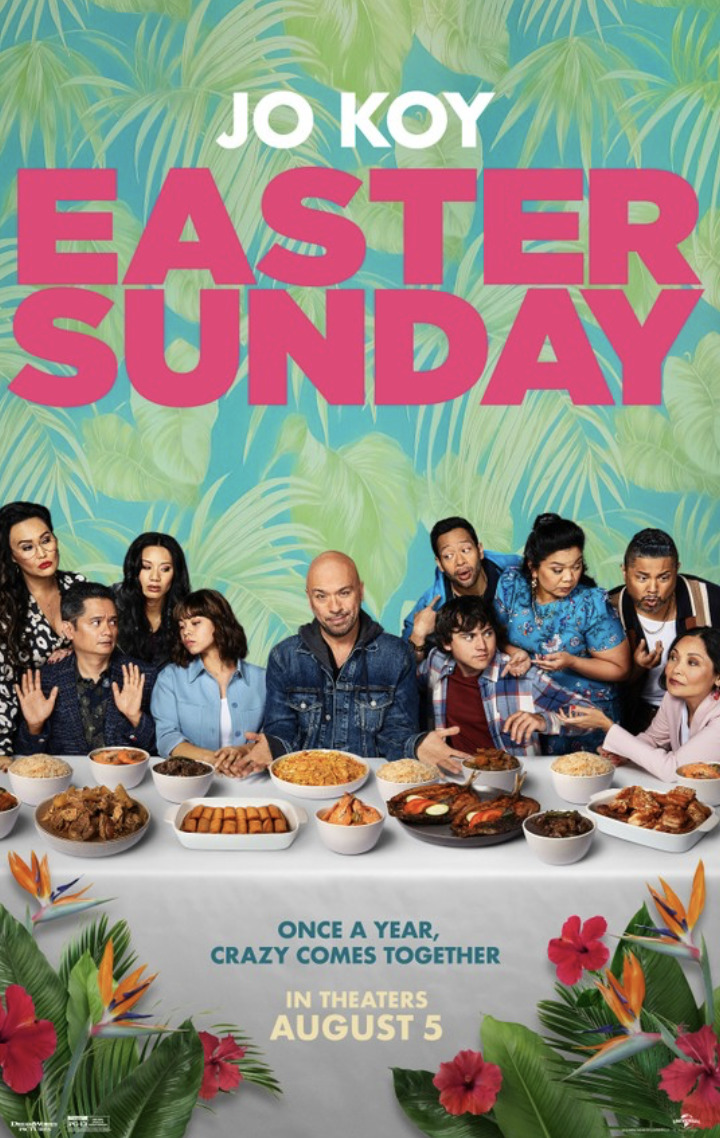
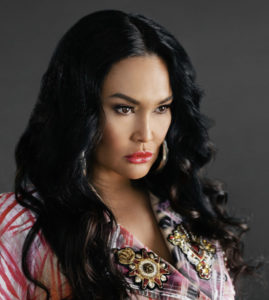
Q : I heard that you knew Jo Koy before he had a breakout as a comedian, how did you know him before?
TC: Yeah, I’ve known him for many years. The first time we met was when he was working behind the desk of the Alexis Park Hotel in Las Vegas, and I was shooting a pilot there. I was checking in late, and I said to him, “I’m sorry for late”… and he said, “I know who you are, you are Filipino, right? I’m also Filipino. I want to get into show business. I want to be a comic but my mom wants me to be a nurse.” So it was a true story, what he tells onstage as a comic. That’s the story of his life.
I stood there fifteen, twenty minutes talking to him, sort of giving a pep talk and saying, “You owe it to yourself to try. You never know how it’s going to turn out.
You know, don’t do it for fame and fortune. If you can’t imagine not doing this, you have to try. Why wouldn’t you? It turned out for me.:
So subsequently, many years later, I was at the Laugh Factory, because I had just done a movie with Jon Lovitz [“High School High”, dir. Hart Bochner (1996)] and Jon Lovitz were going to be playing. And the Filipino guy got up before him.
He was so funny, and after the show I said “You are hilarious! I love that you’re doing your Filipino stuff.” He goes, “You remember, I met you at the Hotel bla-bla-bla . . . ” I was like, “Oh my gosh, I remember!” But he had a lot of hair, and he had big glasses. Subsequently, he doesn’t wear glasses and he doesn’t have hair on his head, so he looks very different. But he said “Oh my gosh, it’s so great” and he kept going. “I’m so happy for you!” and we have kept in touch ever since.
Q: And now he hires you. That’s quite a turnaround.
TC: It’s amazing. It’s wonderful!
Q: There’s a huge rivalry between your character, Tita Theresa, and Jo’s mother, Susan, played by the wonderful Lydia Gaston In this film. I know you two are good friends. It was really fun to watch you two at each other. What was the atmosphere like on set, creating that rivalry?
TC: It was all written there. It’s in the script. So for us, we are both really nice and polite people, and we really enjoy hanging out. It was just like having fun, playing pretend, like when you’re a kid — which is at the heart of acting anyway.
If you can be comfortable in your skin and believe whatever your truth is in that project, that’s all you’re doing. It gave us permission to really go for it. Be nasty. Jay, our director, was telling Lydia, “No, go ahead. If you think you’re big, go even bigger. It’s okay, give yourself permission to be cruel to somebody else.”
Q: In this movie, they said Easter Sunday is like Super Bowl Sunday for Filipinos.
TC: [Laugh] I don’t know about that. But yeah, we do love Easter Sunday. We love getting together.
Q: What was the experience like growing up having that family holiday? You’re also Spanish-Filipino and Chinese Descent…
TC: Spanish, and Chinese. There are two days — even if you don’t go to church — you go to church on Christmas and you go on Easter. So we would always go and do brunch, a nice hotel brunch. That’s what we do in Hawaii.
But in this case, he does like a family picnic. So it’s showing each other about the kind of food you can cook — who’s the better cook. Who looks prettier on that day. That wasn’t exactly in my family upbringing, but it was fun getting to play that here.
In this role, I didn’t base my character Tita Theresa on any one person that I knew. She’s almost a composite character. People that I grew up with in my neighborhood, great-aunts, friends over the years, other people — [I was] cherry-picking different aspects of them, and making it into this one character.
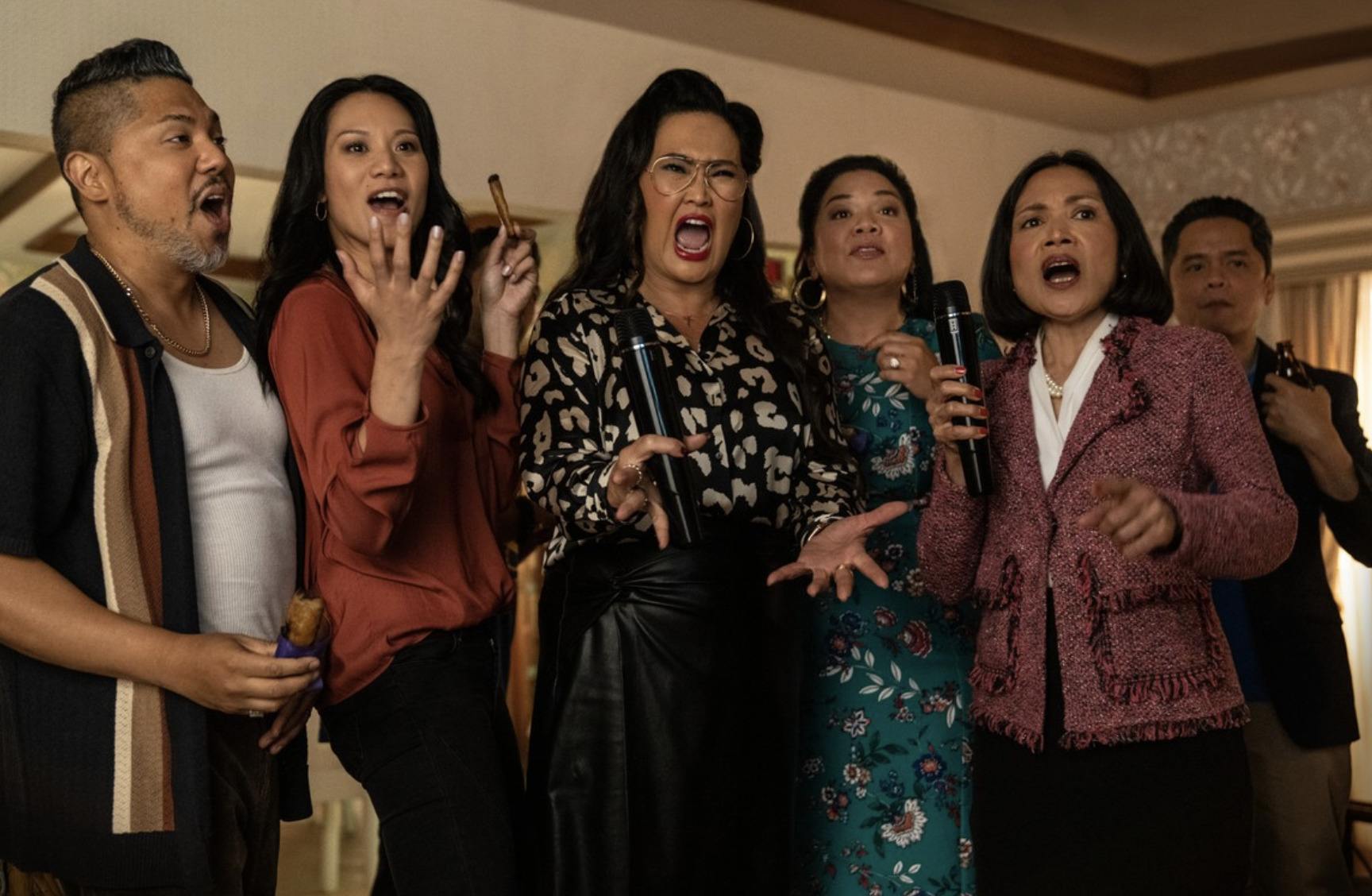
Q: It’s amazing that Amblin Entertainment took a shot at this movie, believing in Jo Koy’s talent for a broad audience. This is the first Filipino film done as a major studio film. Can you talk about that?
TC: Yeah. It’s the first time I’ve ever played a Filipino in a film at all. And it’s the first time that a Filipino family is front and center as the main story of a film.
It took somebody as powerful as Dan Lin at Rideback who did the “It” and “Lego” movies to have that kind of track record. And Steven Spielberg said, “We’re going to open it on the big screen.” So I’m grateful that these big shots are putting their might behind a movie of such cultural diversity.
It’s important to do that to uplift other people. I love that somebody that’s so big and successful is able to uplift other people in stories that wouldn’t be supported by a studio. They don’t see the obvious big-box-office movie. They underestimate the importance of this kind of story being on the screen. So we’re all really grateful to Spielberg for this for sure.
I remember when Jo Koy told me, “It’s so exciting that he saw my comedy on Netflix” — the 11 sold-out shows that he did in Hawaii. It opened his mind to approaching the cultural story in a different way and he saw that Jo had a really fresh outlook.
You know, even though you’re making jokes about different ethnic backgrounds, the whole through-line is that we’re more alike than we’re different. He loved that it uplifted everyone.
Q: When it comes to Asian film, even though we see a film like “Crazy Rich Asians”, independent films like “The Farewell”, stories that center on the Asian American community, we feel like we don’t see many Asian stories on screen. What do you personally think we need to rectify in the film industry when it comes to the Asian community actually being on the screen?
TC: When I started out, there was nobody on screen who looked like me. I would do a great job for a reading and they’d say, “No, we’re not thinking of going ethnic with that role. You’re too exotic for that role.” So it was very like, “I don’t see you, looking the way you are, in my project.” That was really frustrating.
We’re now in a time where we have huge successes, that people have shown up for Asian-driven storylines, and that’s the key. They see Asian people showing up and putting their money where their mouths [are]. They buy the ticket, the book, and go to see the show. If you have an economic demographic that Hollywood sees as profitable, we get to do more.
That’s why I’m urging everyone that wants to see the movie, to please go. See it opening week, so that we can get to do another one in Hawaii or Manila or wherever. The world is wide open now and there’s an opportunity. We must show that show business — it’s show business, show art — that we are a force to be reckoned with. We’ll see more of our faces, front and center, in stories — our stories.
Q: You mentioned you are of Spanish-Filipino and Chinese descent. Because you have such a diverse look that you landed on not only as your character but also Japanese, Chinese, also sometimes Vietnamese descent…
TC: And Thai, Middle Eastern —
Q: Right. Did it frustrate you working in the ‘90s like that, or did you take advantage of it instead, to use your diverse look as an Asian so that you could play any kind of role?
TC: Coming up, it helped me, definitely but it’s been a double-edged sword, as I’ve always said. It was difficult getting cast in shows because I wasn’t all-American-looking. I wasn’t the girl-next-door. I certainly couldn’t play the mother to kids who weren’t my ethnicity. It made it hard. But there were fewer girls when I walked into the room. There were a handful of girls that I would see at auditions, so my odds went way up. Now, [there are] hundreds — or thousands — of actresses that are of mixed descent that look like me.
I can only move into the next phase of my career, which is to be grateful for the fact that I’ve been able to open doors for other people. I see other people coming up behind me that maybe wouldn’t have had a chance. Hollywood has had such a narrow view of what’s acceptable in a film or television show.
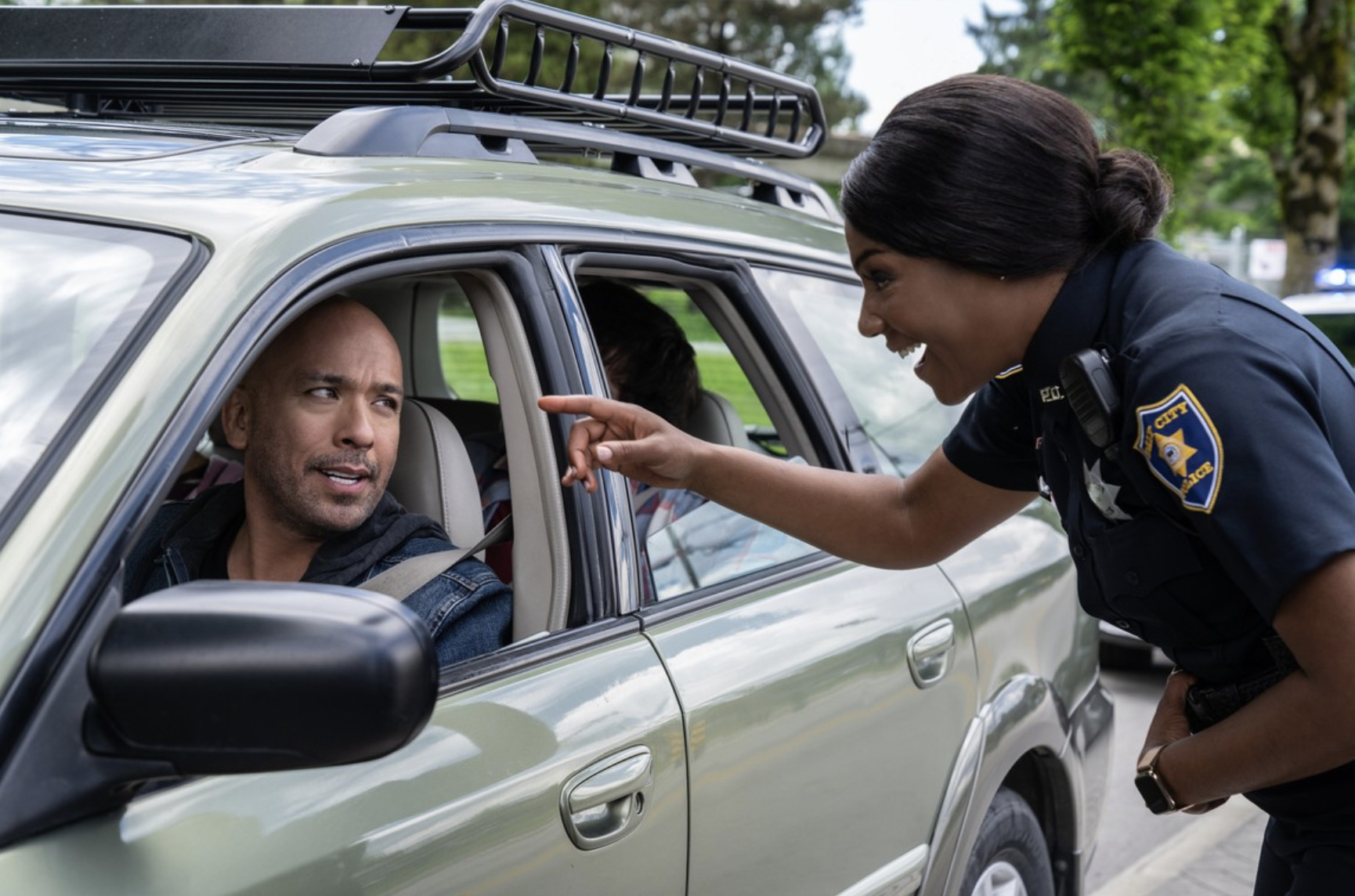
Q: You’ve worked with such a great comedian like Mike Myers, Dana Carvey, Jon Lovitz, and Rob Schneider. Did you have any comedy input on the set?
TC: Lydia and I had set dialogue that was written. But everybody — we all had our microphones on at all times so we could throw in ad libs here and there. So there are lots of ad libbing behind the scenes, and some of that made it onto the screen. It was hilarious. Rodney To, so funny with his ad libs. And Melody [Butiu] and Joey [Guila] — the girl who plays my daughter, and her husband — always saying things under their breath. I was like “What did you just say?
” and it was all microphones. It was great.
Q: How was it working with director Jay Chandrasekhar? He’s also a comedian, so he’d be more likely to use those ad libs.
TC: Jay is so quiet. We were wearing masks, right? It was hard to read him! So I’m thinking, does he like what I’m doing? Does he think it’s funny? Is it not good? I don’t know. You can’t read him. So I actually walked up to him, I said “I can’t tell if you like it or not. Do you like where I’m going with this? Is there anything you want to change?” He goes “No, no, you’re great. I love it. You’re so funny. You bring something different to it that I hadn’t even imagined and it’s so great. I’m happy.” I was like, “Okay, good. I just wanted to check in.”
So after I had that conversation, I wasn’t looking at his face to see if he liked it or not. Because he’s a guy that doesn’t really laugh. All you’d see is [gesture] or whatever. A lot of comedy people, they don’t laugh out loud. They’re like “Oh, it’s good. Okay, good. I like that. Go more with that.” I’m like “Do they hate me?” No, that’s the way comedy people are. Because they’re seeing it and they’re thinking about it, and they’re writing it down or whatever. But they don’t laugh, necessarily.
Q: How did you like working with Lou Diamond Phillips, who is also of Filipino descent?
TC: I’ve known Lou for a very long time. He and I, through a mutual friend, Fritz Friedman, got involved with a lot of Filipino, Fil-Am, endeavors, not the least of which was Filipino veterans of World War II [who] fought at the battle of Bataan, and were told that they would get veterans’ [benefits] from the U.S. military. Then, during the Bush presidency, they took [the veterans’ benefits] back so they didn’t have health care or any of the things that they were supposed to have.
Lou, Fritz and I went to the assembly, Congress, and lobbied for their rights to be [restored]. The veterans got them back, so we were invited to the Philippines by [President] Gloria Macapagal Arroyo. We got awards at the Manila Film Festival. Lou and I got this big trip, and it was the greatest trip of our lives. I got to know him very well. And it was great to finally get to work with him, because I had never worked with him before.
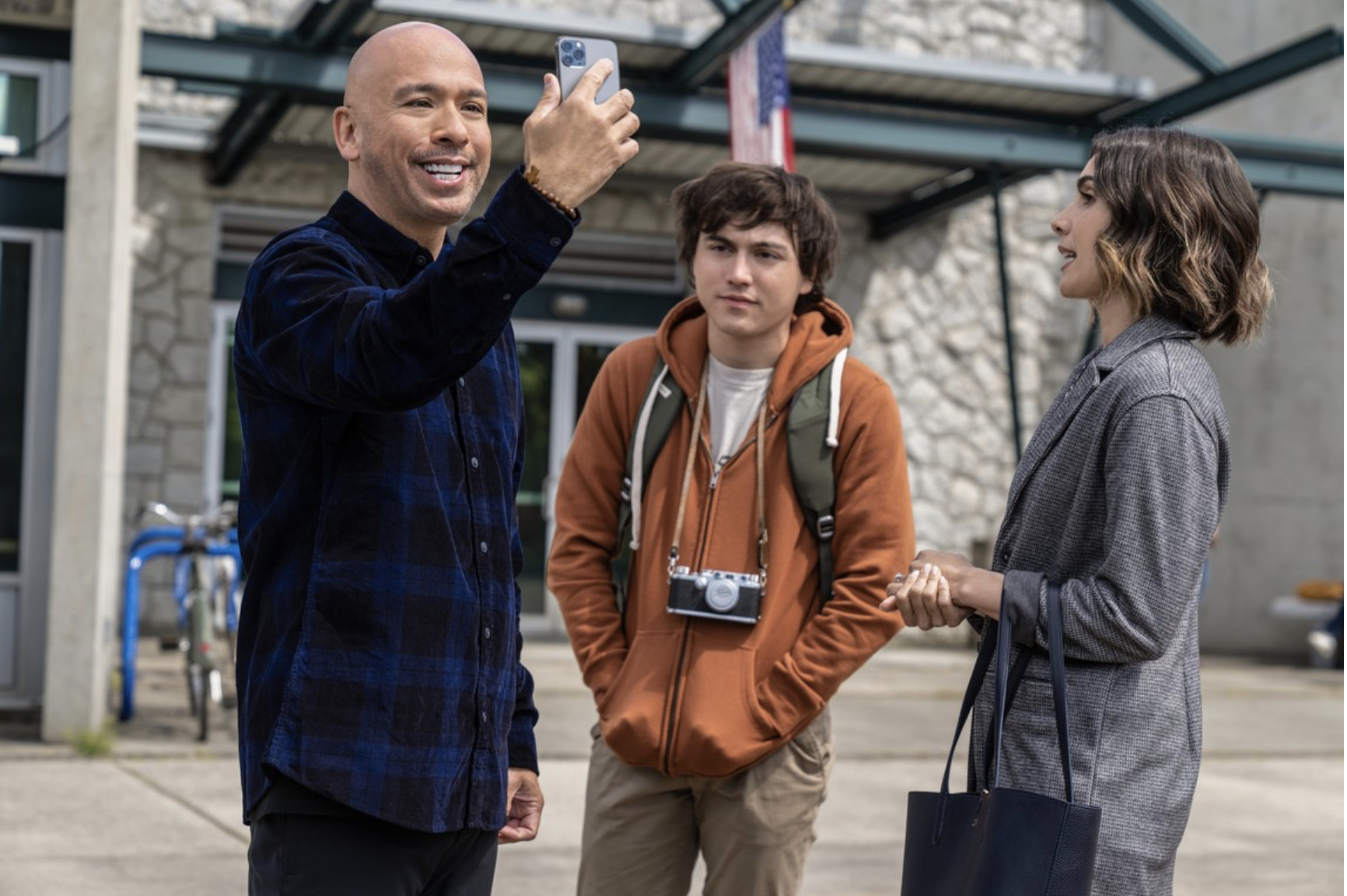
Q: You’re also a singer and have won a couple of Grammy Awards. Are there any roles that you want to play or any projects you want to tackle in the future, maybe behind the camera?
TC: I have a couple of ideas that I’m working on right now — just small, really dark, tortured kind of indie scripts — for Sundance that I get to write, direct, and star in. Something to play and be more involved in, this world that I want to create. I haven’t really had designs on directing, per se. But I have this vision of what it looks like and how I want to be in a movie unlike anything that I’ve done before. Just to really show my acting chops, because I’m not always up and happy and jokey. I think there’s a deeper, darker side that I’d like to explore in film also.
Q: You have worked with great actors, great directors and great comedians. What was the best advice that you got from any of them?
TC: The very simplest was from Sean Connery. He is a Movie Star. When I worked on “Rising Sun” with him, he walked into the room and everybody was gestures– until he said something, and made a joke, and then everybody relaxed. He was a big movie star — 007. They don’t make movie stars like that anymore. So he said “When you walk into a room with your shoulders thrown back and your head held high, you look like you belong.”
I always think about that. You know, it’s true. That’s how he was. He was always himself in a role — no matter Russian submarine captain, or in “The Untouchables”, an old Chicago [Irish cop] — he’s always Sean Connery, and it’s the way he carried himself and the way he always belonged. That’s movie star acting.
Q: This film can appeal to not only Filipinos, but also to a much wider audience. What do you want the audiences to take away from this movie?
TC: I think about this new song that they have, that we’re submitting for the Grammys again this year. It’s called “Colors in Harmony”, and it’s about social unity, diversity, and inclusivity. I sing it in Tagalog and English, and other people do it in Japanese, Chinese and Hawaiian. We all can come together and be in harmony — colors in harmony. I hope that we see more diversity and different ethnic backgrounds represented on the big and small screen. Just like we have when you walk out your door, the world looks more like us than some of the stuff on TV right now, so it’d be nice to have more faces represented.
Q: Thank you so much.
Check out more of Nobuhiro’s articles.
Here’s the trailer of the film.

